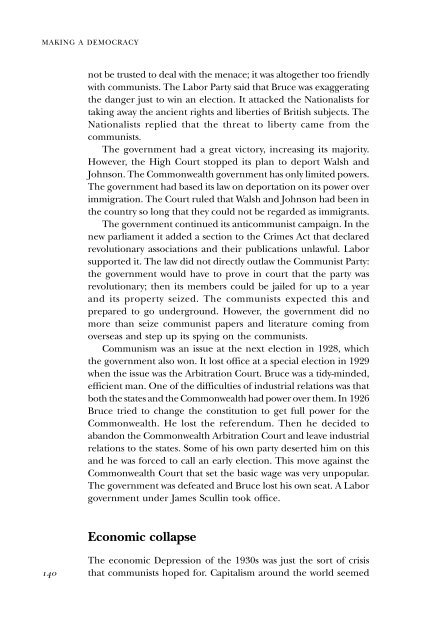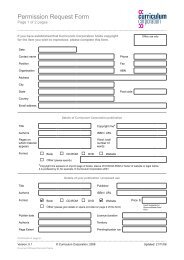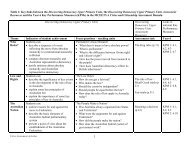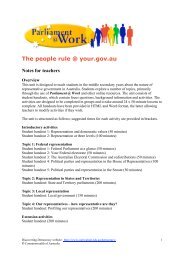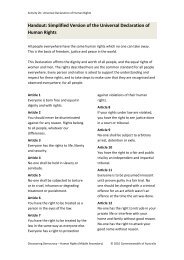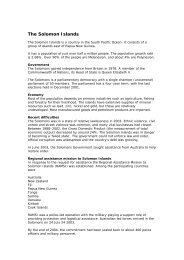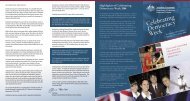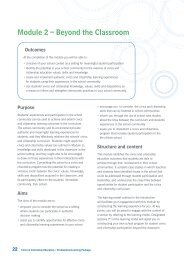Australia's Democracy pp 128-140 - Civics and Citizenship Education
Australia's Democracy pp 128-140 - Civics and Citizenship Education
Australia's Democracy pp 128-140 - Civics and Citizenship Education
You also want an ePaper? Increase the reach of your titles
YUMPU automatically turns print PDFs into web optimized ePapers that Google loves.
MAKING A DEMOCRACY<br />
not be trusted to deal with the menace; it was altogether too friendly<br />
with communists. The Labor Party said that Bruce was exaggerating<br />
the danger just to win an election. It attacked the Nationalists for<br />
taking away the ancient rights <strong>and</strong> liberties of British subjects. The<br />
Nationalists replied that the threat to liberty came from the<br />
communists.<br />
The government had a great victory, increasing its majority.<br />
However, the High Court sto<strong>pp</strong>ed its plan to deport Walsh <strong>and</strong><br />
Johnson. The Commonwealth government has only limited powers.<br />
The government had based its law on deportation on its power over<br />
immigration. The Court ruled that Walsh <strong>and</strong> Johnson had been in<br />
the country so long that they could not be regarded as immigrants.<br />
The government continued its anticommunist campaign. In the<br />
new parliament it added a section to the Crimes Act that declared<br />
revolutionary associations <strong>and</strong> their publications unlawful. Labor<br />
su<strong>pp</strong>orted it. The law did not directly outlaw the Communist Party:<br />
the government would have to prove in court that the party was<br />
revolutionary; then its members could be jailed for up to a year<br />
<strong>and</strong> its property seized. The communists expected this <strong>and</strong><br />
prepared to go underground. However, the government did no<br />
more than seize communist papers <strong>and</strong> literature coming from<br />
overseas <strong>and</strong> step up its spying on the communists.<br />
Communism was an issue at the next election in 1928, which<br />
the government also won. It lost office at a special election in 1929<br />
when the issue was the Arbitration Court. Bruce was a tidy-minded,<br />
efficient man. One of the difficulties of industrial relations was that<br />
both the states <strong>and</strong> the Commonwealth had power over them. In 1926<br />
Bruce tried to change the constitution to get full power for the<br />
Commonwealth. He lost the referendum. Then he decided to<br />
ab<strong>and</strong>on the Commonwealth Arbitration Court <strong>and</strong> leave industrial<br />
relations to the states. Some of his own party deserted him on this<br />
<strong>and</strong> he was forced to call an early election. This move against the<br />
Commonwealth Court that set the basic wage was very unpopular.<br />
The government was defeated <strong>and</strong> Bruce lost his own seat. A Labor<br />
government under James Scullin took office.<br />
Economic collapse<br />
<strong>140</strong><br />
The economic Depression of the 1930s was just the sort of crisis<br />
that communists hoped for. Capitalism around the world seemed


